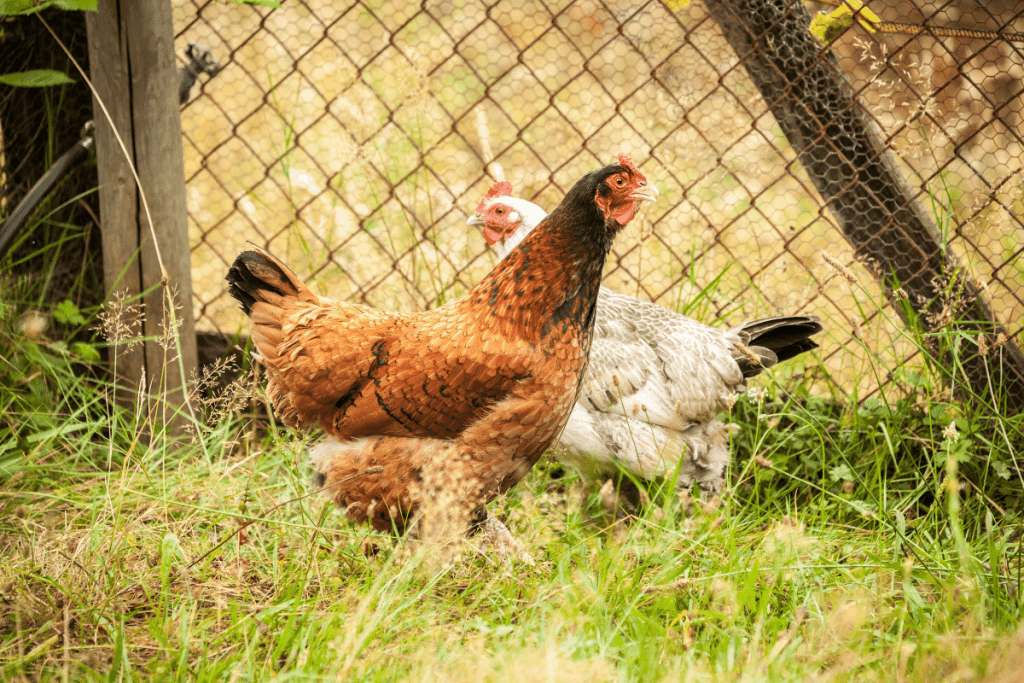If you’ve added Wyandotte chickens to your backyard flock, knowing how to care for them is essential.
This includes becoming familiar with Wyandottes’ diets as well. It’s crucial to know what to feed Wyandotte chickens and how much.
Key Takeaway:
Most adult Wyandotte chickens can eat ¼ lb. of chicken feed daily. Unlike some breeds of chickens, Wyandotte chickens don’t have a lot of dietary restrictions. Most backyard chicken keepers rely on commercial feed for meals and smaller treats.
If you have questions about what diet to provide your Wyandottes, read on!
We’ll explain everything you need to know about caring for these splendid birds.

Table of Contents
ToggleWhat to Feed Wyandotte Chickens
Most chicken keepers use commercial feed for their Wyandottes.
However, the age of your birds plays a big role in what varieties of chicken feed are appropriate for their diet.
Newborn Chick Diets
Until six weeks old, your Wyandottes need a newborn chick’s diet.
Chick starter feed is the best option to turn to here.
This caters well to the high protein intake baby chicks require.
Most commercial chick starter feed comprises around 20% to 22% protein content.
7-20 Week-Old Wyandottes
Once you hit the seven-week mark, switch to pullet feed.
Your backyard bird doesn’t need as high a protein intake at this age.
Pullet feed focuses on delivering around 14 -16% protein.
Wyandottes at Laying Age
Around 20 weeks, Wyandottes start laying eggs for the first time.
All you have to do is keep an eye out for the eggs your chicken lays.
Once they’ve laid an egg, you’ll need to change their feed.
This is because once a chicken is laying, its protein intake changes again.
Most chicken lovers provide their feathered friends with protein layer feed with 15-18% protein.
On Treats
Like any animal friend, chickens deserve a treat now and again as part of a varied diet.
This can include things like fruits and veggies or even a table scrap here or there.
This is fine as long as the chickens aren’t fed any food they can’t digest.
These treats should only take up about 10% of a chicken’s diet.
The rest of their diet goes to feed.
How Much Do Wyandottes Eat?
Daily, expect Wyandottes to eat at least a quarter-pound of chicken feed.
The exact amount they eat can vary.
For one, smaller but still healthy birds may eat less food as they eat proportionately to their individual needs.
In addition, you might notice your birds eating more as the winter months roll in.
What Are Wyandotte Chickens Used For?
Wyandottes are dual-purpose chicken.
This means they’re used both as meat birds and for egg production.
As such, this is a larger American breed, and expect Wyandotte hens to produce many eggs.
Yet, it’s not uncommon for Wyandottes to have other uses.
Many chicken lovers keep these birds as pets.
Some even live as show birds, thanks to their physical appearance.
Further Reading: Do Wyandotte chickens make good meat poultry?
Are Wyandotte Chickens Good for Beginners?
If you’re new to raising poultry, a Wyandotte chicken is an excellent breed.
As far as chicken breeds go, these charming chaps are docile and friendly and kept for a few different purposes.
As for care, they don’t have complicated dietary requirements and aren’t often loud either.
This makes them the perfect chicken for a farm with plenty of space or a backyard in a more urban setting.
All of these factors help make Wyandottes handy as a family or beginner chicken, but their gentle temperaments are helpful to experienced chicken keepers as well.
Commonly Asked Questions
Are Wyandotte Chickens Quiet?
Noise level is a common issue among backyard chicken flocks.
Luckily, Wyandotte chickens are one of the quieter breeds of backyard poultry.
This makes them a great choice for keeping a flock in the suburbs since you’ll get all the benefits of raising chickens without bothering your neighbors too much.
Are Wyandotte Chickens Cold Hardy?
Cold hardy birds can fair well in cold winter conditions.
This means they’ll withstand it well as the winter months come in and the temperature starts to plunge.
This can save chicken keepers on heaters for adult chickens in the winter.
However, this doesn’t mean abandoning all of your usual chicken-keeping duties.
It’s crucial to still offer these birds a draft-free chicken coop to stay warm during the brutal winters.
You’ll also want to watch for signs of frostbite from the cold weather.
Are Wyandottes Heat Hardy?
Wyandottes aren’t as heat-hardy as they are cold-hardy.
Heat exhaustion is among the common health issues that chickens face during the summer.
You’ll have to watch your chickens for this as the temperature starts to heat up.
This doesn’t mean keeping Wyandottes in an area with hot, humid summers is impossible.
You just have to make sure they’re comfortable.
Providing extra water and shade and ensuring they have a ventilated chicken coop to cool their feathers.
This practice among backyard chicken keepers will help keep your feathered friends safe and cool.
Do Wyandotte Chickens Get Along with Other Chickens?
As a more docile breed, Wyandotte chickens tend to get along with other breeds in their flock well.
Yet, this doesn’t mean other birds can walk all over your Wyandottes.
While docile, this breed isn’t afraid to stand up for itself.
If another breed of bird challenges them, Wyandottes won’t hesitate to assert their dominance and secure their place in the flock hierarchy.
Concerning people, Wyandottes are often still docile but not always friendly.
This breed can sometimes come off as shy towards humans, but over time, you’ll break them out of their shells.
This is much easier if you raise them when they’re baby chicks.
They may not become lap chickens, but they are friendly.
How useful was this post?
Click on a star to rate it!
We are sorry that this post was not useful for you!
Let us improve this post!
Tell us how we can improve this post?
